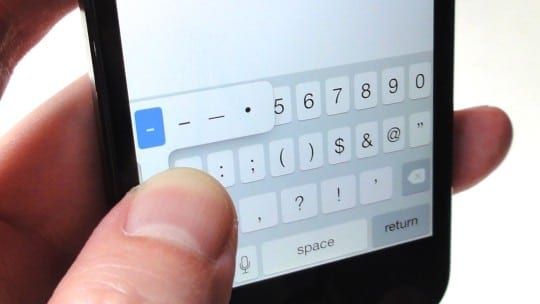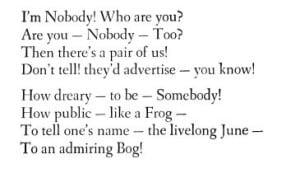
Repeat after me: "I am not Emily Dickinson."
Oh, would that PR writing were more like poetry! We can learn much from that art: precision, economy of language, euphony. But one cue we should not take is to borrow the Belle of Amherst's penchant for using a long dash as a substitute for any and all punctuation. It's becoming an issue; if you don't believe me, tap the nearest editor on the shoulder, look her straight in her bloodshot eyes and ask her which punctuation mark most bedevils her inbox.
To be clear, I love dashes. But I love them for what they are intended to be: moments of emphasis, or abrupt changes and interruptions in a train of thought. Deployed once or twice in a piece of writing, they have a startling effect. "Wake up!" they say. "Curveball comin' at ya!" When they are strewn throughout your copy, your voice comes across as unhinged, unable to communicate coherently, bouncing Robin Williams-like from impulse to impulse.

Well, it's time to stand up for restraint and examine your writing for signs of this creeping menace. So back to basics: the dash (either an em dash with no spaces around it or en dash with spaces, check your style guide) can be used to signal some sort of interruption or change of thought. "For such a tiny state, Singapore is a powerhouse of global commerce, and also happens to have a fantastic airport where I didn't even mind being delayed for four hours last month—but I digress" is a classic usage.
A pair of dashes is often used to set off a nonessential phrase. Nonessential, that is, in the grammatical sense. Sometimes that phrase is the most important part of the sentence. "The new Civic Center is a remarkable addition—a disgrace, some would say—to our cityscape." Here, the added phrase gives us a sense of controversy and an idea of what this building must look like. But a nonessential phrase can also be set off by parentheses. What's the difference? It's sometimes a matter of taste, but in my view, dashes are best used to emphasize something important, whereas parentheses explain details or fine distinctions. My inner monologue raises its voice to say the phrase in the dashes, but says the parenthetical phrase under its breath.
Misuse of the dash usually comes in the form of substituting it where a colon, semicolon or comma would do a better job. "I have several fears—spiders, heights, volcanos." Introducing a list like that should be the domain of the colon. "Fire juggling is dangerous—many an aspiring daredevil has been hospitalized for burns." Joining two independent (but related) clauses? Classic semicolon.
Many of the most frequent dash abusers, however, may have a bigger problem than simply selecting the best punctuation mark for the job. If you find yourself having to jam dashes in everywhere, it might be a sign that your thoughts are cluttered and disjointed. It's best to take a few deep breaths, focus on what exactly your point is and how you want to arrive at it, and start over. The dash is the ace up your sleeve: Use it sparingly and at the right time for best results. Use it too often, and you'll get busted. And the people around you will probably think about beating you up.
Follow Ian James Wright: @ianwright0101
